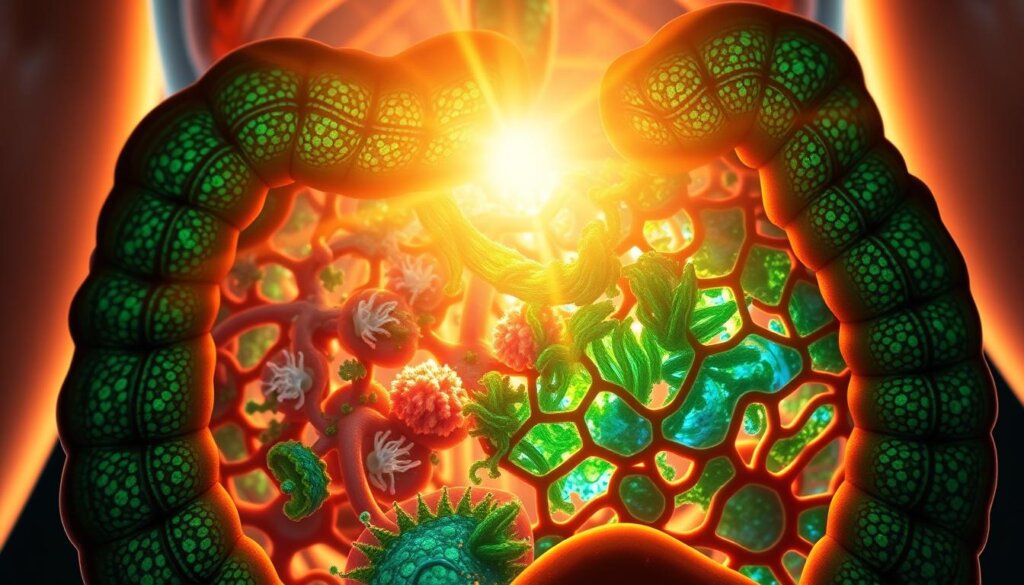What if tiny organisms in your digestive system could reshape how your body manages energy? Emerging science reveals a surprising link between gut health and metabolic processes that impact weight management and overall vitality.
This guide explores how beneficial microorganisms interact with nutrient absorption and hormone balance. Studies suggest these microbes might influence calorie processing efficiency and even reduce inflammation – factors critical for maintaining healthy metabolic function.
Research highlights specific mechanisms, like the production of short-chain fatty acids that regulate appetite. Certain bacterial strains, such as Lactobacillus gasseri, show potential in supporting healthy weight management when combined with balanced nutrition. Clinical trials demonstrate how targeted formulations may help optimize fat storage patterns.
Wellness Group’s approach combines cutting-edge research with personalized strategies. Their expertise helps individuals navigate the complex relationship between digestive wellness and energy regulation, offering science-backed solutions tailored to unique needs.
Key Takeaways
- Gut microorganisms influence nutrient processing and energy utilization
- Specific strains may reduce fat absorption and regulate appetite hormones
- Short-chain fatty acids play a key role in metabolic regulation
- Personalized probiotic solutions can support weight management goals
- Gut lining health impacts systemic inflammation and metabolic efficiency
Introduction to Probiotic Benefits and Metabolic Health
Your gut hosts a bustling community that shapes daily well-being. This microscopic world influences everything from nutrient processing to immune responses, creating a foundation for vitality.
What Are Probiotics?
These live microorganisms act as natural allies for your body. Found in fermented foods like kimchi and tempeh, they help maintain balance in digestive ecosystems. Research shows they strengthen immune defenses and support heart function by managing cholesterol levels.
Gut Ecosystem’s Metabolic Role
Trillions of microbes in the intestines outnumber human cells tenfold. They produce vitamins like B12 and K2 while regulating hormones linked to hunger and energy storage. A balanced microbiome helps optimize how nutrients get absorbed, preventing excessive calorie retention.
Modern diets high in sugar and low in fiber often disrupt this delicate system. Stress and antibiotics further complicate microbial harmony. Strategic use of quality supplements helps restore equilibrium, promoting efficient metabolic function naturally.
Understanding the Gut Microbiome and Metabolic Processes
Hidden within your digestive tract lies a microscopic workforce that transforms food into fuel. This biological assembly line converts nutrients into usable energy while managing waste – a process heavily influenced by your gut microbiota composition.
How Gut Bacteria Influence Energy Extraction
Your body relies on gut bacteria to break down complex fibers that human enzymes can’t process. These microorganisms produce enzymes that ferment dietary fiber, creating valuable short-chain fatty acids as byproducts. The two dominant bacterial families – Bacteroidetes and Firmicutes – play distinct roles in this energy harvest.
Studies reveal an intriguing pattern: individuals with healthy weight ranges typically show higher Bacteroidetes levels. Those with weight challenges often have more Firmicutes, which excel at extracting calories from food. This balance affects how efficiently the body uses or stores energy.
Impact of Short-Chain Fatty Acids on Metabolic Health
Acetate, propionate, and butyrate – three key fatty acids – act as metabolic multitaskers. They nourish colon cells, regulate appetite hormones, and influence how cells use glucose. Butyrate specifically supports healthy inflammation responses, creating better conditions for efficient energy use.
These compounds may help optimize metabolism by communicating with organs involved in energy regulation. Research suggests they improve insulin sensitivity while reducing fat storage signals, creating a ripple effect throughout the body’s metabolic networks.
Do probiotics improve metabolism?
Emerging research reveals fascinating connections between microbial balance and how our bodies process energy. The relationship extends beyond digestion, influencing how nutrients get converted into fuel or stored as reserves.
Mechanisms Behind Probiotic Effects on Calorie Absorption
Specific bacterial strains interact with food in surprising ways. Lactobacillus varieties alter how dietary fats get broken down, increasing their excretion through waste. This process effectively reduces the calories absorbed from meals.
These microorganisms also communicate with hunger signals. They stimulate the release of hormones like GLP-1 and PYY, which help people feel satisfied with smaller portions. Simultaneously, they promote proteins that limit fat cell expansion.
Evidence from Research Studies on Probiotics
Multiple trials demonstrate measurable changes in body composition. A 12-week study showed participants using targeted supplements experienced 3% reductions in body fat compared to placebo groups. Waist circumference measurements also decreased significantly.
Research highlights improvements in metabolic markers beyond weight management. Enhanced insulin sensitivity and reduced inflammatory compounds appear consistently across studies. These changes create better conditions for maintaining energy balance long-term.
Scientists continue exploring how different strains offer unique benefits. Current evidence suggests combining specific bacteria types could amplify their positive effects on metabolic health.
Probiotic Strains and Their Role in Weight Management
Not all microbial allies work the same way when supporting metabolic goals. Research reveals distinct bacterial varieties offer unique advantages for maintaining healthy body composition.

Targeted Microbial Support
Lactobacillus gasseri leads scientific discussions about microbial weight support. A meta-analysis of 15 trials showed this strain helped reduce waist measurements by 1.5 cm and body mass index by 0.5 kg/m² in individuals with excess weight.
Strategic Strain Combinations
Studies demonstrate Lactobacillus curvatus and plantarum work particularly well when paired with physical activity. Participants combining these strains with exercise lost 3% more visceral fat than control groups over 12 weeks.
Bifidobacterium animalis subsp. lactis offers dual-action benefits. This strain not only supports healthy inflammation responses but also appears to influence fat storage patterns. A 2020 trial recorded 2.6% greater body fat reduction compared to placebo groups.
Effective microbial solutions require careful selection. Choosing the right supplements involves matching specific strains to individual needs. Multi-strain formulas often yield better results by addressing multiple metabolic pathways simultaneously.
Current evidence suggests microbial support works best alongside nutritional balance and regular movement. This combined approach helps optimize results while promoting sustainable lifestyle changes.
Addressing Metabolic Syndrome Through Probiotics
Could balancing gut microbes hold the key to tackling metabolic challenges? Research reveals how specific bacterial strains might address multiple factors linked to metabolic syndrome—a condition affecting 1 in 3 Malaysian adults.
Influence on Insulin Sensitivity and Inflammation
Chronic inflammation acts like slow-burning fire in the body, disrupting how cells respond to insulin. Studies show certain microbial strains reduce inflammatory markers by up to 23% in people with obesity. This calming effect helps cells better absorb glucose, potentially lowering diabetes risk.
A 2021 review of 12 trials found participants using targeted supplements saw 12% greater improvements in insulin sensitivity compared to control groups. These changes occurred alongside reductions in waist circumference and blood pressure measurements.
Benefits for Managing Cholesterol Levels
Gut bacteria interact with bile acids—digestive substances made from cholesterol. Specific strains bind to cholesterol molecules, helping remove them through waste. This process may explain why some studies report 8-10% drops in LDL (“bad”) cholesterol levels after consistent use.
Other mechanisms include blocking cholesterol absorption in the intestines. Trials demonstrate these effects work best when combined with fiber-rich diets, creating a dual-action approach for supporting cardiovascular health.
Emerging evidence suggests microbial therapies could become valuable allies against metabolic disorders. While not standalone solutions, they show promise as part of comprehensive lifestyle strategies for maintaining healthy blood sugar and lipid profiles.
Integrating Probiotics into a Balanced Diet and Lifestyle
A thriving gut environment starts with smart dietary choices. Pairing strategic nutrition with active habits creates the ideal conditions for microbial balance and metabolic efficiency.

Fueling Microbial Allies Naturally
Prebiotics act like premium fertilizer for beneficial bacteria. These specialized fibers – found in garlic, oats, and bananas – resist digestion until reaching the colon. There, they feed microbial populations that produce short-chain fatty acids, crucial for maintaining gut lining integrity and regulating inflammation.
Combining prebiotic-rich foods with probiotic supplements creates a power duo. Research shows this pairing may help enhance nutrient absorption by 18% compared to using either component alone. It also supports diverse bacterial colonies, reducing reliance on high-dose supplements over time.
Simple dietary swaps make a difference. Adding asparagus to meals or snacking on apples provides natural prebiotics. Fermented options like yogurt complement these fibers, creating a gut-friendly plate. This approach aligns with proven health benefits of probiotics while promoting sustainable habits.
Balanced eating patterns sustain microbial communities better than temporary fixes. Regular consumption of varied fiber sources helps maintain stable populations of beneficial bacteria. Over weeks, this supports consistent metabolic function and overall wellness.
Wellness Group's Probiotic Solutions and Customer Support
Maintaining optimal wellness requires smart support systems tailored to individual needs. Wellness Group offers science-backed solutions designed to complement modern lifestyles, with expert guidance for those exploring microbial balance strategies.
Their team provides personalized recommendations for gut health optimization, including formulations that may assist with weight management goals. For those managing blood sugar concerns, their probiotic solutions for diabetes management combine targeted strains with practical lifestyle advice.
Connect With Wellness Experts
Reach their specialists via WhatsApp at +60123822655 for quick answers about supplement options. The team helps people understand how specific formulations could support their unique health journey.
Flexible Consultation Options
Wellness Group operates Mondays through Saturdays with extended hours for working professionals. Virtual consultations allow convenient access to metabolic health advice from home, while in-person meetings provide detailed lifestyle assessments.
FAQ
Can gut bacteria affect weight management?
Yes, certain microbes influence how the body extracts energy from food. Strains like Lactobacillus gasseri and Bifidobacterium animalis subsp. lactis may reduce calorie absorption, supporting healthier body composition.
How do short-chain fatty acids support metabolic health?
Compounds like butyrate and acetate, produced by gut microbes during fiber fermentation, regulate appetite hormones and improve insulin sensitivity. This balance helps maintain stable blood sugar and reduces fat storage.
Which probiotic strains are linked to reduced inflammation?
Studies highlight Lactobacillus rhamnosus and Bifidobacterium longum for lowering inflammatory markers tied to obesity. These strains may also enhance gut barrier function, preventing toxins from triggering metabolic issues.
Are there probiotics that improve cholesterol levels?
Certain strains, such as Lactobacillus reuteri, bind to bile acids in the gut, prompting the liver to use excess cholesterol. This process can lower LDL (“bad” cholesterol) and support cardiovascular health.
How long does it take to see results from probiotics?
Effects vary, but research suggests improvements in digestion or energy levels may appear within 2–4 weeks. For metabolic benefits like weight management, consistent use over 8–12 weeks is often recommended.
Should prebiotics be paired with probiotics?
Combining prebiotic-rich foods (e.g., garlic, oats) with supplements enhances microbial diversity. This synergy boosts the production of beneficial compounds like short-chain fatty acids, amplifying overall wellness benefits.
What’s the best way to contact Wellness Group for consultations?
Reach their team via WhatsApp at +60123822655 during business hours (Mon–Sat, 9 AM–6 PM GMT+8). They offer personalized guidance on strain selection and usage for individual health goals.






